Yalanji
March 5th, 2009
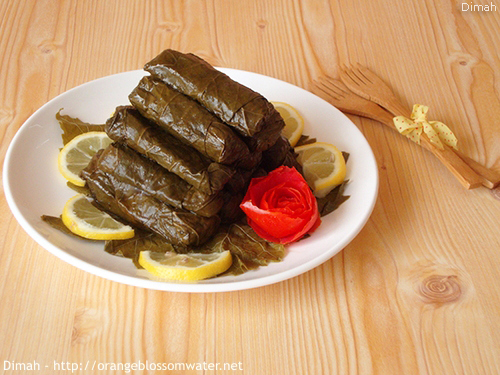
Yalanji is grape leaves stuffed with rice and a variety of vegetables, it is served as cold appetizer. Yalanji from Turkish (Yalanci Dolma) which means “liar”, it is called “liar” because the filling doesn’t have meat.
Let’s make Yalanji:
Before talking about the method of cooking Yalanji, I’ll tell you some information about two things:
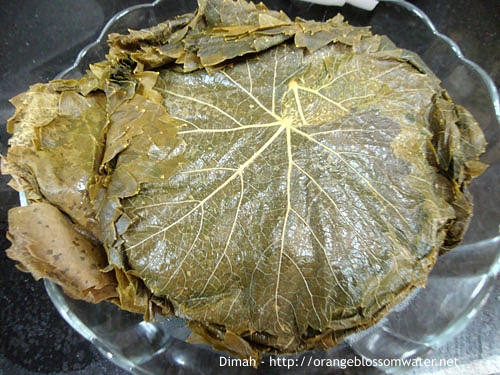
1. Grape Leaves:
Read all the notes about grape leaves in the post (Waraq Al-E’nab).
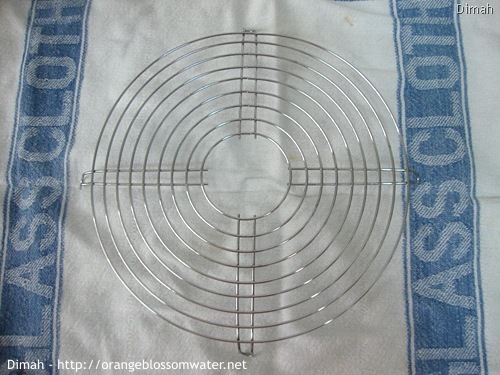
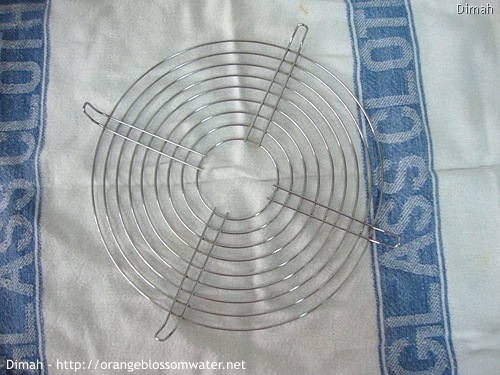
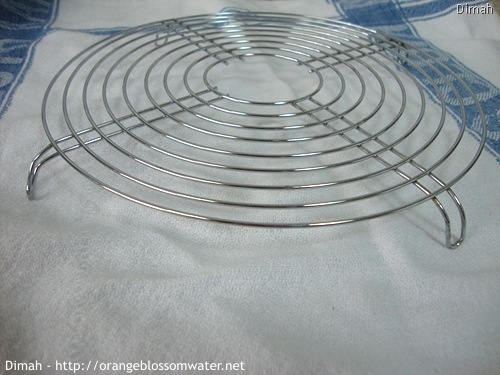
2. Round Cooling Rack:
This is needed for the technique of cooking “Yalanji”, it provides a protection for the stuffed vegetables, make sure the cooling rack is completely from stainless steel and with feet, it should be approximately 3/4″ elevated.
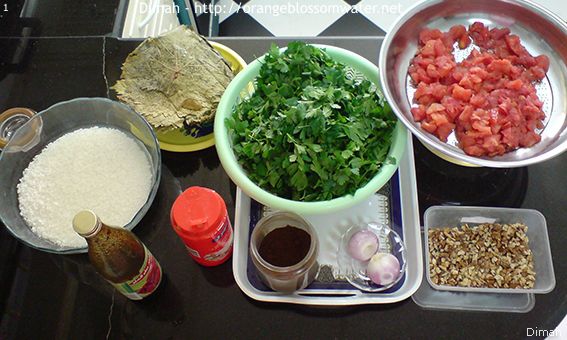
1. Prepare all ingredients.
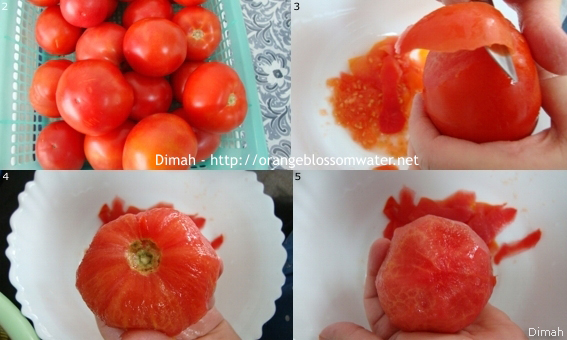
1. Bring red tomatoes.
2, 3, 4. Peel tomatoes completely, do not use the method of boiling tomatoes then peel them, it is very easy to bring a knife and peel tomatoes without boiling them.
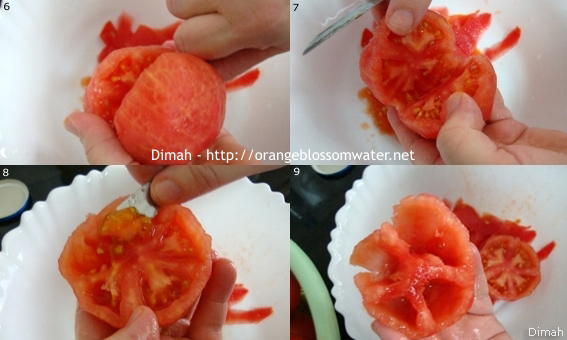
5, 6. Cut peeled tomatoes into half.
7, 8. Deseed the tomatoes.
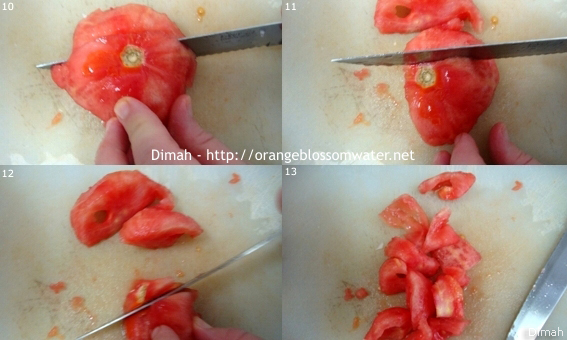
9, 10, 11, 12. Cut tomatoes into small cubes.
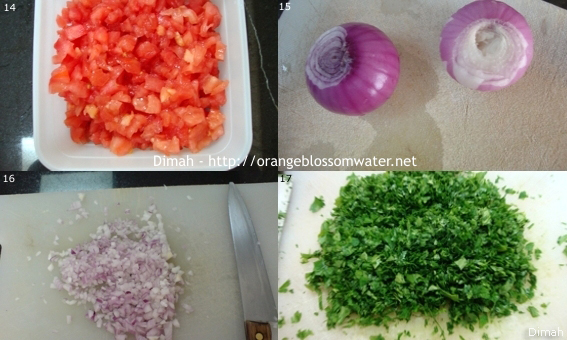
14. Set tomatoes aside.
15,16. Finely chop onion, and set aside.
17. Finely chop parsley leaves.
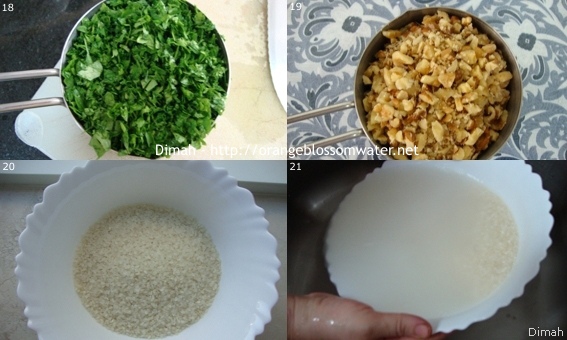
18. Set chopped parsley aside.
19. Chop walnuts into small pieces, and set aside.
20, 21. Rinse rice in several changes with cold water.
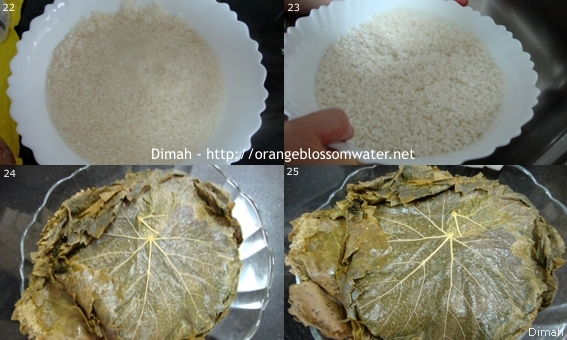
22. Soak rice in boiled water for 10 minutes.
23. Drain rice, and set aside.
24, 25. You can see in the picture Grape Leaves, these are frozen at home.
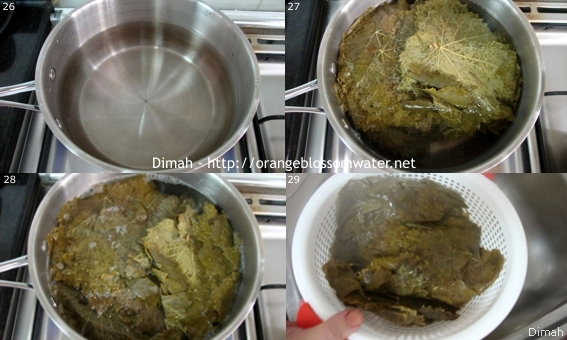
26. In pot, put water and bring to boil.
27, 28. Once water is boiling, turn off heat, then add the stack of grape leaves to water, and keep for 10 minutes.
29. Place the stack on a strainer or colander to drain, and set aside.
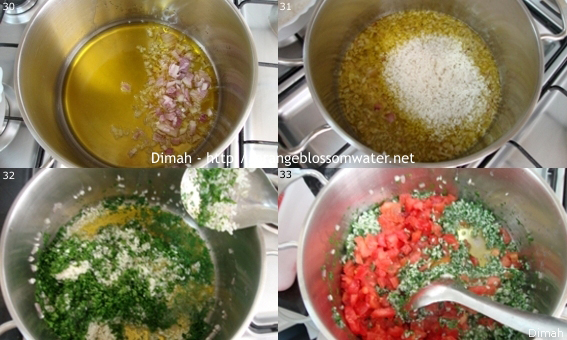
30. In a pot, add olive oil and turn on low heat, then add chopped onion to oil, and stir for 2 minutes.
31. Add rice to onion, and stir for 4 minutes.
32. Add finely chopped parsley leaves, and stir.
33. Add chopped tomato cubes, and stir.
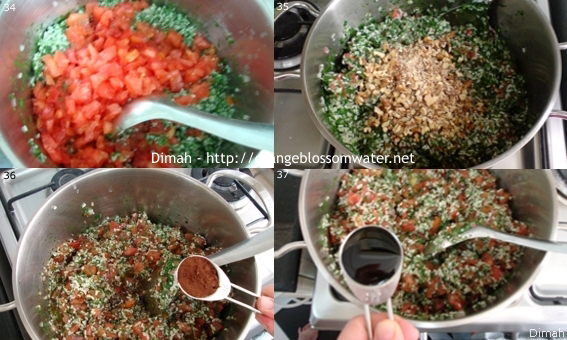
34. This is after additions of all tomatoes, stir.
35. Add chopped walnuts, and stir.
36. Add Turkish coffee powder.
37. Add pomegranate molasses.
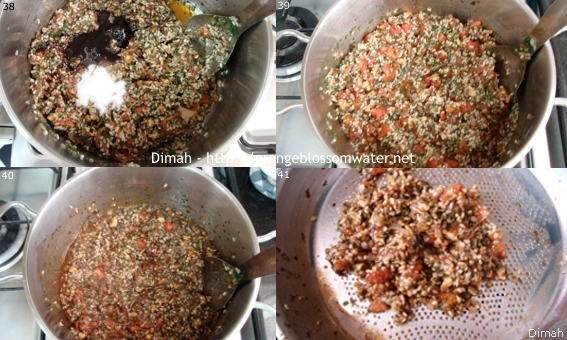
38. Add 1 1/2 teaspoons lemon salt (citric acid), 3 teaspoons salt, and 1/4 teaspoon black pepper.
39, 40. Keep the filling on low heat with stirring for about 5 minutes, then turn off heat.
41. Drain the filling in a strainer over a bowl.
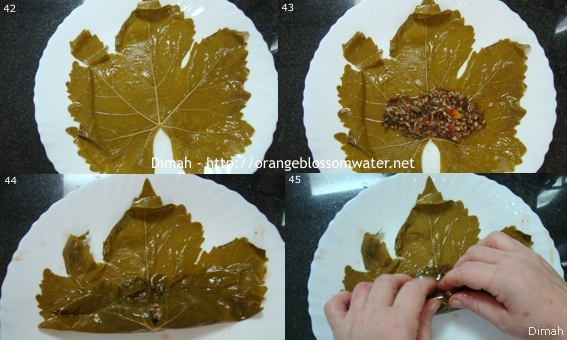
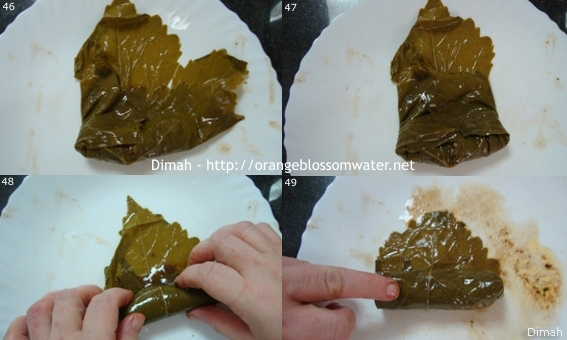
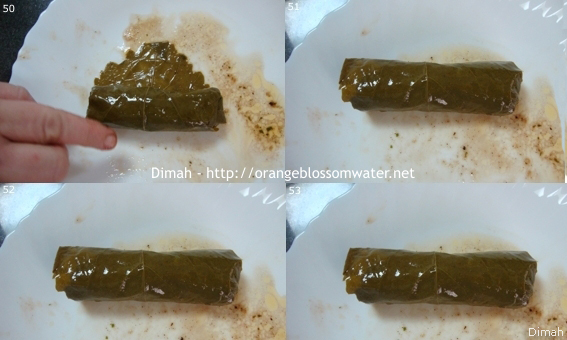
Roll the Grape Leaves
42 – 53. These steps show you how to roll the grape leaves.
Choose the leaves that are large size.
The filling is added to the side where the veins of the leaves are most prominent.
The amount of filling added to each leaf is about 1 tablespoon + 1 teaspoon (this amount of filling is for a leaf that has size approximately 5 – 6 inches (12 – 15 cm)). The amount of filling depends on the size of the leaf. Do not roll them too tightly.
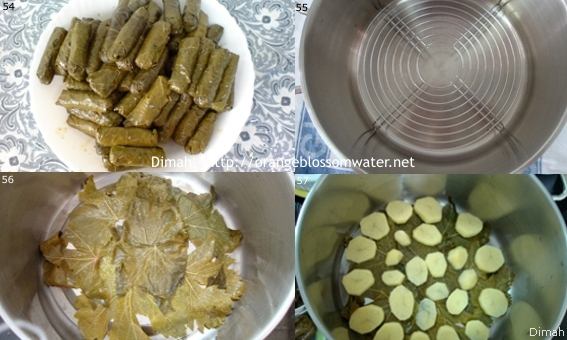
54. This is all the quantity of rolled grape leaves.
Cooking stuffed grape leaves
55. Prepare a large deep pot, and put the round cooling rack on the bottom of the pot. The round cooling rack works as a protection for the stuffed grape leaves; to prevent the direct contact between the stuffed grape leaves and the heat.
56. Add unrolled grape leaves over the round cooling rack.
57. Add sliced potatoes over the unrolled grape leaves.
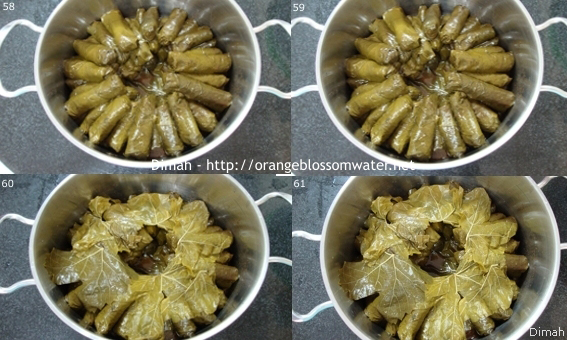
58, 59. Arrange the stuffed grape leaves in the pot, the same way in the picture.
60, 61. Put over the stuffed leaves unrolled grape leaves.
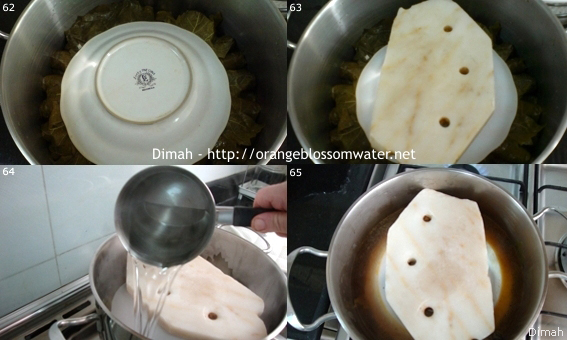
62. Put a plate over the grape leaves.
63. Add a weight over the plate, this is a piece of marble.
64, 65. Pour 1600 ml boiling water on the rolled leaves in the pot, water level must be more than the top level of the bowl, and keep on high heat until it starts to boil vigorously.
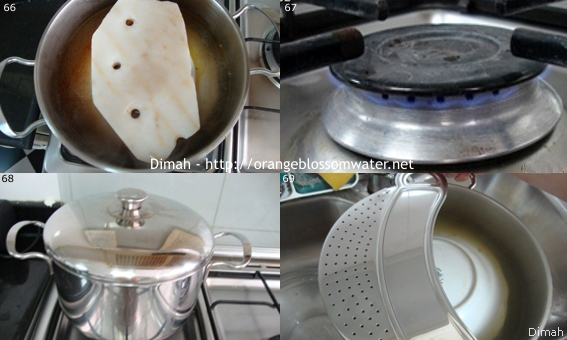
66. Once the water is boiling vigorously, add 1 1/2 teaspoons lemon salt (citric acid) and 1 1/2 teaspoons salt to the cooking water.
67. Lower the heat, the picture shows that the heat should be very low (the lowest heat).
68. Cover the pot with the lid, and cook on lowest heat for 2 hours.
69. After 2 hours, it should be ready (you can take one and taste), and if it is cooked turn off heat, drain the cooking water to a bowl.
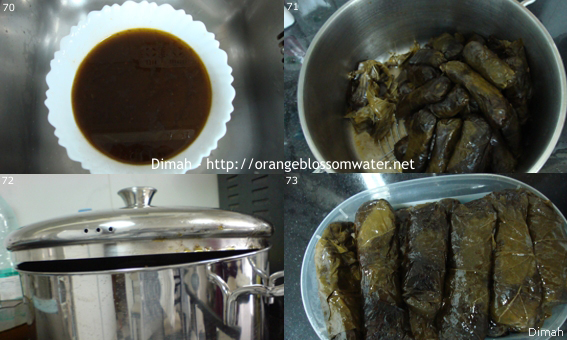
70. Keep the cooking water in a bowl.
71, 72. Keep stuffed grape leaves (Yalanji) in the pot, and recover the pot lid partially, as you see in the picture, just little, and leave it 30 mintues.
73. After 30 minutes you can take your stuffed grape leaves and keep them in any bowl or container.
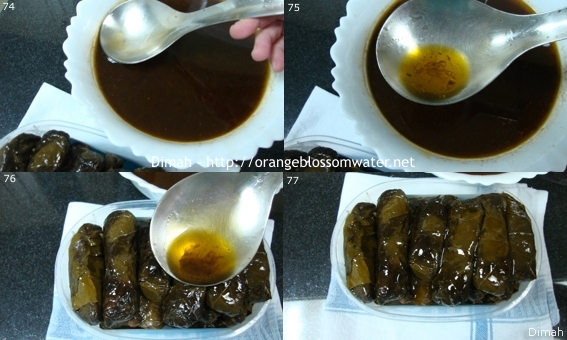
74, 75. You can see the cooking water, use a spoon and skim off the top layer (the top layer is olive oil that was released during cooking), add this oil to the stuffed grape leaves.
76. This step will keep the stuffed leaves moisturized and shiny.
Allow Yalanji to cool at room temperature.
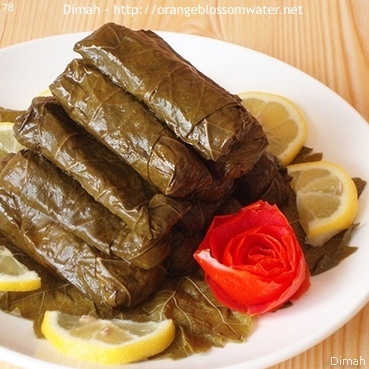
78. Store Yalanji covered in fridge, and serve it cold.
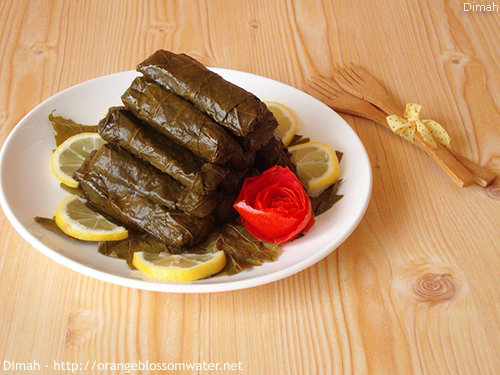
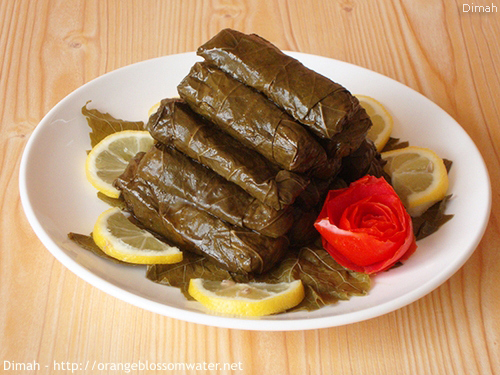
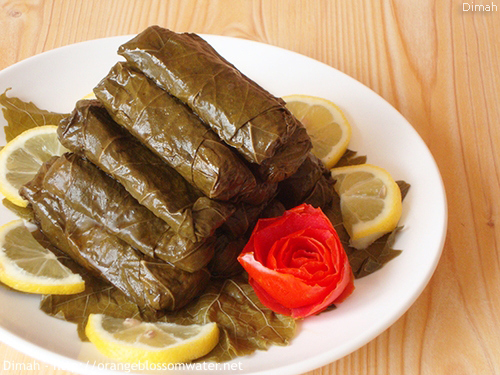
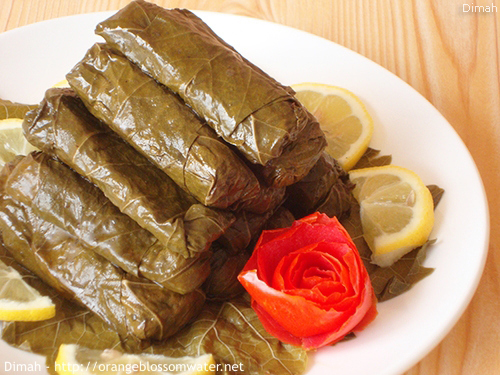
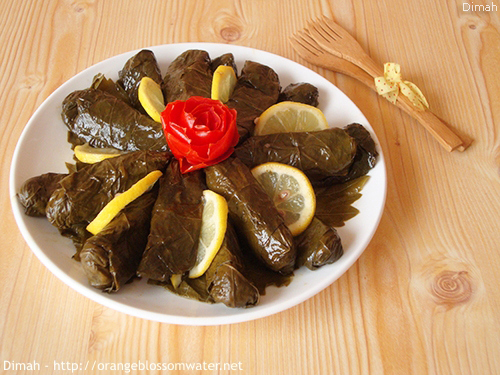
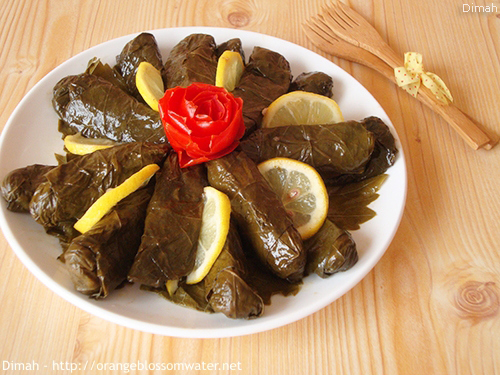
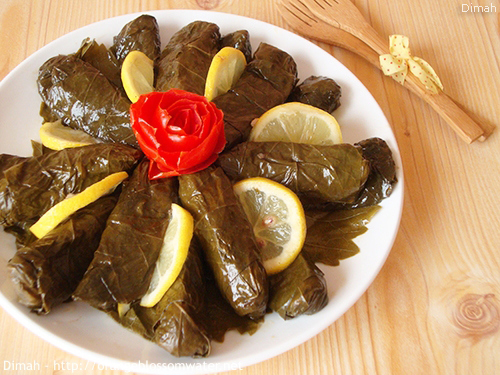
Yalanji
From: Family Recipe / Servings: 70 – 75 Stuffed Grape Leaves
PDF Text Only / Print With Images
| 350 g grape leaves, large in size
Boiling water, for grape leaves Filling 1500 g red tomatoes 2 medium red onions 1 1/2 cups finely chopped flat 1/2 cup chopped walnuts, (small chopped) 310 g Egyptian short grain rice Boiling water, for soaking rice 1 cup olive oil 1 tbsp Turkish coffee powder (with cardamom, read notes and tips) 3 tbsp pomegranate molasses 1 1/2 tsp lemon salt (citric acid) 3 tsp salt 1/4 tsp black pepper Cooking stuffed grape leaves Additional grape leaves, not rolled (explained in the directions) 2 – 3 potatoes, sliced to circles 1600 ml boiling water, for cooking stuffed grape leaves 1 1/2 tsp lemon salt (citric acid) 1 1/2 tsp salt
|
Prepare ingredients. Bring red tomatoes. Peel tomatoes completely, do not use the method of boiling tomatoes then peel them, it is very easy to bring a knife and peel tomatoes without boiling them. Cut peeled tomatoes into half. Deseed the tomatoes. Cut tomatoes into small cubes. Set tomatoes aside. Finely chop onion, and set aside. Finely chop parsley leaves. Set chopped parsley aside. Chop walnuts into small pieces, and set aside. Rinse rice in several changes with cold water. Soak rice in boiled water for 10 minutes. Drain rice, and set aside. You can see in the picture Grape Leaves, these are frozen at home. In pot, put water and bring to boil. Once water is boiling, turn off heat, then add the stack of grape leaves to water, and keep for 10 minutes. Place the stack on a strainer or colander to drain, and set aside. In a pot, add olive oil and turn on low heat, then add chopped onion to oil, and stir for 2 minutes. Add rice to onion, and stir for 4 minutes. Add finely chopped parsley leaves, and stir. Add chopped tomato cubes, and stir. Add chopped walnuts, and stir. Add Turkish coffee powder. Add pomegranate molasses. Add 1 1/2 teaspoons lemon salt (citric acid), 3 teaspoons salt, and 1/4 teaspoon black pepper. Keep the filling on low heat with stirring for 5 minutes, then turn off heat. Drain the filling in a strainer over a bowl. Roll the Grape Leaves The steps in the pictures shows you how to roll the grape leaves. Choose the leaves that are large size. The filling is added to the side where the veins of the leaves are most prominent. The amount of filling added to each leaf is about 1 tablespoon + 1 teaspoon (this amount of filling is for a leaf that has size approximately 5 – 6 inches (12 – 15 cm)). The amount of filling depends on the size of the leaf. Do not roll them too tightly. Cooking stuffed grape leaves Prepare a large deep pot, and put the round cooling rack on the bottom of the pot. The round cooling rack works as a protection for the stuffed grape leaves; to prevent the direct contact between the stuffed grape leaves and the heat. Add unrolled grape leaves over the round cooling rack. Add sliced potatoes over the unrolled grape leaves. Arrange the stuffed grape leaves in the pot, the same way in the picture. Put over the stuffed leaves unrolled grape leaves. Put a plate over the grape leaves. Add a weight over the plate, this is a piece of marble. Pour 1600 ml boiling water on the rolled leaves in the pot, water level must be more than the top level of the bowl, and keep on high heat until it starts to boil vigorously. Once the water is boiling vigorously, add 1 1/2 teaspoons lemon salt (citric acid) and 1 1/2 teaspoons salt to the cooking water, then remove the weight but keep the plate. Lower the heat, the picture shows that the heat should be very low (the lowest heat). Cover the pot with the lid, and cook on lowest heat for 2 hours. After 2 hours, it should be ready (you can take one and taste), and if it is cooked turn off heat, drain the cooking water to a bowl. Keep the cooking water in a bowl. Keep stuffed grape leaves (Yalanji) in the pot, and recover the pot lid partially, as you see in the picture, just little, and leave it for 30 minutes. After 30 minutes you can take your stuffed grape leaves and keep them in any bowl or container. You can see the cooking water, use a spoon and skim off the top layer (the top layer is olive oil that was released during cooking), add this oil to the stuffed grape leaves. This step will keep the stuffed leaves moisturized and shiny. Allow Yalanji to cool at room temperature. Store Yalanji covered in fridge, and serve it cold. |
Notes and Tips
Turkish coffee powder is available in market either plain (without cardamom) or blended with cardamom. For Yalanji, Turkish coffee powder blended with cardamom is used. Turkish coffee powder is the secret ingredient for authentic Yalanji , so do not skip using it.

Very nice, I can use the recipe for the filling of yalanji.
I love your website, your step by step recipes make it so easy and detailed with precise measurements that really help instead of what my mother would tell me “a pinch of this, and a little bit of that”.
Can you make a post about yabra2 too? For some reason when I make it, it never turns out like my moms..
keep up the good work
Sarah: Many thanks for the kind comment! hope you enjoy Yalanji and I’m glad you like the website!
Yabraq post is almost ready, I’ll post it inshallah soon!
wow..is this correct coffee powder? in the filling? are you sure you dont mean cinnamon/allspice..if not what flavor does the coffee powder give i cant imagine!!!!
miriam: yes, it is turkish coffee powder
thank you Dimah, but im truly intrigued almost shocked to be honest…my family is from middle east and have travelled throughout the region but have never heard of using turkish coffee powder in cooking!! two questions for you ..what flavor does this impart and is this a family innovation or something particular to your region?thank you in advance for any insight into this..
miriam: I can’t describe the flavor, but when I taste Yalanji I know if it has turkish coffee powder, it gives unique taste.
and yes, it’s particular to my region, not a family innovation..
Thanks and sorry for the delay..